Significant improvements in mechanistic biomarkers of how Dialive™ improves organ function
- adonia-aliver
- 8th January 2021
- 0
- Uncategorised
- 3286
- 3
The ALIVER Consortium announces positive results from Phase 2 equivalent trial of the novel liver dialysis device, Dialive™

January 7, 2021 – The ALIVER Consortium is pleased to announce positive data from the randomised controlled clinical trial of Dialive™ in adult patients with liver failure. The study found that twice as many patients with a history indicative of alcohol-related cirrhosis suffering from multiorgan failure, a condition referred to as acute-on-chronic liver failure (ACLF), recovered to having no organ failure when treated with the Dialive™ device compared to the control group. ALIVER is a consortium focused on developing a new treatment for patients with liver failure for whom there are no specific approved therapies apart from liver transplantation. The consortium is composed of partners from across Europe, led by University College London (UCL), and includes Yaqrit Ltd, a life sciences company and intellectual property owner of Dialive™, the European Foundation for the Study of Chronic Liver Failure, and EASL, amongst others. The consortium is developing and testing a novel blood filtration system, DIALIVE, whose design is based on 20 years of research led by Prof. Rajiv Jalan, Prof. Nathan Davies and members of the Liver Failure Group at UCL. Yaqrit Ltd was spun off from UCL in 2014 to develop and potentially commercialise treatments including Dialive™ for patients with advanced liver disease. Prof. Jalan is the lead scientific founder of Yaqrit.
Dialive™ is a patented, dual filtration system that can be delivered using a kidney dialysis machine. It includes two specialised filters – one to remove blood-borne products of liver failure, such as products of cell death and bacterial toxins, and the other to remove albumin that is damaged and toxic when the liver fails. The damaged albumin is then replaced with fresh albumin.ACLF is a condition characterised by systemic inflammation and is associated with single or multiple organ failure. The result is a high short-term risk of death. In ACLF patients, 28-day mortality can be as high as 88.9%1 depending on the number of organs failing.
The safety and tolerability primary endpoints of the randomised controlled trial were met. There were no significant differences in serious adverse events (SAEs) between the control and study group. In addition, more patients receiving Dialive™ treatment resolved to a “no-ACLF” status than the control arm, and they resolved faster (p=0.03). Improvement in the Dialive™-treated patients was also seen in a panel of biomarkers thought to be associated with the cytokine storm and organ failure in ACLF. These showed statistically significant benefits for patients on Dialive™ compared to the control arm, ten days after the start of the treatment protocol of three to five sessions of eight to 12 hours each. The conclusions set forth in this announcement remain subject to finalising the remaining data analysis, the statistical and clinical study report and, therefore may change.
1 Arroyo V, Moreau R, Jalan R. Acute-on-Chronic Liver Failure. N Engl J Med. 2020 May 28;382(22):2137-2145.
Prof. Rajiv Jalan M.D., Professor of Hepatology at UCL and Coordinator of the ALIVER Consortium and an inventor of Dialive™, commented:
I am delighted to share these incredibly promising data which indicate that Dialive™ has the potential to significantly change the outlook for ACLF patients by reversing the course of their disease. Currently, there are no approved therapies for ACLF and around 40% of patients die within three months of hospital admission. We believe Dialive™ could potentially be a much-needed solution and Yaqrit is planning to further trials to facilitate the product’s path to regulatory approval.
I acknowledge gratefully the support of the EU H2020 grant, the huge contribution of all our collaborators, and the patients who have been instrumental in the progress the consortium has made in allowing the development of this treatment that has the potential to save the lives of patients with liver failure.
Dr Banwari Agarwal, Consultant Intensivist at Royal Free Hospital and Chief Investigator of the trial, commented:
This is an exciting milestone in the development of a treatment for patients with Acute on Chronic Liver Failure, a culmination of 25 years of work by some of the consortium’s members. We recognise the importance of the funding provided by the EU H2020 grant, which has been paramount in the development of Dialive™ and success of ALIVER. The results will pave the way for Dialive™ to progress to later phase clinical trials.
Prof. Rafael Bañares of the School of Medicine, Universidad Complutense and Hospital General Universitario Gregorio Marañón, Madrid said:
The consortium was established to develop new therapies which could offer solutions to patients who currently have very few options. The data from this study highlights the potential of Dialive™ to do just this and we look forward to seeing this novel approach get to patients as quickly as possible.
The ALIVER Consortium has received funding from the European Union’s Horizon 2020 research and innovation programme under grant agreement No 733057. Yaqrit, the Dialive™ intellectual property and commercial rights holder and member of the ALIVER Consortium, intends to conduct a randomised European pivotal trial in 2021. Plans are also underway to pursue a US regulatory pathway.
Full results from the trial will also be submitted for peer-reviewed publication in a leading scientific journal.
***
For media enquiries, please contact:
Consilium Strategic Communications
Amber Fennell
Tel: +44 (0) 20 3709 5700
Email: fennell@consilium-comms.com
About Dialive™
Dialive™ is a novel liver failure treatment device designed to reverse the accumulation of protein-bound toxins and increased susceptibility to infection caused by liver failure, for which liver transplantation is the main alternative treatment. The Dialive™ device, protected by worldwide patents, incorporates albumin removal and replacement and, endotoxin removal. The device is being studied in clinical trials in patients with acute on chronic liver failure (ACLF) up to grade 3a (up to three organs in failure).
About ALIVER
The ALIVER consortium includes many of Europe’s leading of experts in liver failure and the hospitals where they work, small and medium-sized enterprises (SMEs) and not-for-profit organisations, with over 20 years of experimental research and data collection exploring extracorporeal liver support in liver failure. Dialive™ research has received funding from the European Union’s Horizon 2020 research and innovation programme under grant agreement No 733057. For more information visit www.aliver.info
About Yaqrit
Yaqrit is a clinical stage life sciences company focused on developing innovative treatments for patients with advanced liver disease in areas of high unmet medical need. The Company was founded by internationally renowned hepatologist Prof. Rajiv Jalan of UCL, who has three decades of clinical, academic and research experience in treating patients with chronic liver disease. With his guidance, the Company has developed a clinical stage pipeline led by three programs: Carbalive™ and Dialive™, both of which have complete randomised controlled clinical trials, and TLR4 antagonists, the most advanced of which is being developed by Akaza Bioscience, a joint venture with Takeda Pharmaceutical and Zenios Bioscience. These programs are designed to address unmet medical needs across the advanced stages of chronic liver disease from medically stable patients with decompensated cirrhosis in the outpatient setting, to critically ill, hospitalised patients with acute-on-chronic liver failure (“ACLF”). The application of the different therapeutic approaches to specific patient groups is based upon the Company’s deep understanding of the pathway and stratification of patients with chronic liver disease. For more information visit www.yaqrit.com
The Journal of Hepatology – July 2019
- fineanddandy
- 29th July 2019
- 0
- Uncategorised
- 4441
- 0
Acute-on-chronic liver failure in patients with alcohol-related liver disease
Liver transplantation in patients with multiple organ failures: Feasibility and outcomes
Incidence, predictors and outcomes of acute-on-chronic liver failure in outpatients with cirrhosis
An Accurate Data Preparation Approach for the Prediction of Mortality in ACLF Patients Using the CANONIC Dataset
- fineanddandy
- 29th July 2019
- 0
- Uncategorised
- 4446
- 0
New liver failure treatment could be here by 2020
- hyatt-antognini-amin
- 18th December 2018
- 0
- Uncategorised
- 4954
- 0
DIGESTIVE WELLNESS 170,000 people in Europe die from liver failure every year. The cirrhosis death toll could be cut from 2020, thanks to advanced dialysis technology being trialled in the UK and Europe now.
Many people with liver disease do not see it coming until it’s too late.
Millions of people around the world are unaware they have liver disease, which may be nonalcoholic steatohepatitis (NASH), nonalcoholic fatty liver disease (NAFLD) or even cirrhosis.
“In the UK, 0.5% of the population have cirrhosis, the scarring of the liver that is the end-stage of liver disease, but 75% of them do not know,” says Rajiv Jalan, Professor of Hepatology at the Institute for Liver and Digestive Health, Division of Medicine, at University College London and Honorary Consultant at the Royal Free Hospital.
Many people find they have cirrhosis when they enter hospital for something else
“Every year in the UK, 50,000 to 100,000 people go to hospital because of accidents, infections, over-drinking, or for surgery, and discover that that they have cirrhosis,” says Jalan. “About 20-30% of them develop acute-on-chronic liver failure (ACLF) and multi-organ failure, which may affect the brain, the heart or the immune system. This carries a 30% risk of death within four weeks.
“You can go from walking around with no idea that you are at risk to your deathbed in just four weeks.”
At present, treatment centres on supportive care for the failing organs – including dialysis. The only potential cure is a liver transplant – and there is currently a shortage of donated livers. Every year 170,000 people in Europe die from liver failure.
New dialysis machine uses liver’s regeneration properties
However, the liver can regenerate itself – and a new dialysis technology, now being trialled, takes advantage of that.
Jalan says: “If we can get over the two- to four-week period when the patient is at high risk of death, and prevent more damage to the liver, it will start to repair itself.”
Jalan is the project coordinator of the ALIVER project, which is trialling a new dialysis machine, called DIALIVE. An advance on existing dialysis technology, it uses two specialised filters to remove blood-borne products of liver failure such as products of cell death, toxins from bacteria and metabolic toxins, which traditional dialysis machines do not.
It also replaces the albumin that is depleted or destroyed when the liver fails.
Jalan says: “This could keep the patient alive long enough for the liver to regrow or for a transplant donor to be found.”
The DIALIVE technology was invented at UCL and is being developed by spin-off company Yaqrit. The €7.8 million ALIVER project, funded by the EU Horizon 2020 research programme, runs until 2020.
Current trials for liver disease will see results next year
DIALIVE is being trialled in several hospitals across Europe, and its benefits are being compared to the standard of care. “Initial results are due in 2019 and if they are positive, a larger study will go ahead later in the year,” says Daniel Green, CEO of Yaqrit. “This technology has the potential to save the lives of liver patients who are at a high risk of short-term mortality.”
Meanwhile, Jalan points out that risk factors for liver diseases include obesity, over-drinking and liver diseases such as viral hepatitis, and says: “Ask your GP for a liver function check.”
http://www.healthawareness.co.uk/digestive-wellness/new-liver-failure-treatment-could-be-here-by-2020
Animated short created to raise public awareness about liver failure
- hyatt-antognini-amin
- 11th April 2018
- 0
- Uncategorised
- 5291
- 1
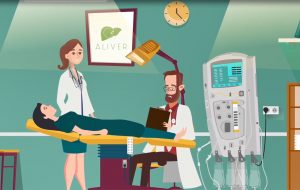
The incidence of liver disease is increasing and it can lead to liver failure. An estimated 170,000 patients die from liver failure each year in Europe. During liver failure, an accumulation of protein-bound toxins and increased susceptibility to infection cause multiorgan failure and death. Liver transplantation is the only treatment, but it is limited by organ availability.
ALIVER is a project that has received funding from the European Union’s Horizon 2020 Research and Innovation Programme under grant agreement number 733057.
For more information contact:
Hyatt Antognini-Amin
press@easloffice.eu
www.aliver.info
ALIVER Project Gains Traction via EU Parliament News Service
- hyatt-antognini-amin
- 15th November 2017
- 0
- Uncategorised
- 5464
- 0
November 15, 2017, London, UK – Today the European Commission published a press release covering the ALIVER project. The article, “Saving lives with a new liver dialysis device,” was also shared by Dods Information Service via their inter-parliamentary newsletter.
To read the full article, visit: ec.europa.eu
ALIVER project featured in the National Digestive Health Campaign
- hyatt-antognini-amin
- 27th September 2017
- 0
- Uncategorised
- 5551
- 0
September 28, 2017, London, UK – The ALIVER project today, was featured in the National Digestive Health Campaign launched by Media Planet. The aim of the campaign is to raise awareness, provide insightful and informative content and break the stigma around digestive health issues in the UK. The campaign will focus on current research breakthroughs and developments in prevention, diagnosis and treatment solutions. It will also provide insight into future opportunities for innovation within these areas. The campaign will be targeted towards clinical commissioning groups, health care professionals, university students, patients and the general public. Project Coordinator, Dr. Rajiv Jalan was interviewed for the editorial titled: New dialysis technology could cut cirrhosis deaths, where he discussed the project, DIALIVE technology, and the impact liver dialysis could have on the global population.
The editorial is also available in print and will be included as a supplement in The Guardian.
To read the full article available online, visit: MediaPlanet
The ALIVER project at the 18th ISAD
- hyatt-antognini-amin
- 12th September 2017
- 0
- Uncategorised
- 5585
- 0
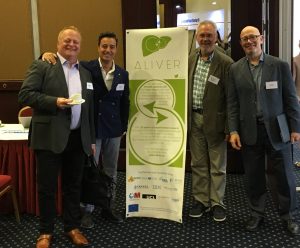
Conference hosts Professor Steffen Mitzner, and Professor Jan Stange warmly welcomed attendees on the evening of the 8th at the reception, along with members of the Albutec GmbH team.
“We are proud that this symposium has evolved from an albumin dialysis meeting to a more comprehensive meeting on liver support technologies available not only in the intensive care unit but now also in standard dialysis within hospital units and even in ambulatory centers,” said Prof. Steffen Mitzner, President, Department of Medicine, University of Rostock.
Dr. Banwari Agarwal from University College London (UCL), presented the ALIVER study on the 9th and discussed detoxification and endotoxin removal combined in acute on chronic liver failure (AoCLF). This year’s conference sponsors included ALIVER consortium partners: Albutec GmbH, EASL on behalf of the ALIVER project, and Yaqrit, the creators of DIALIVE.
First patient treated in trial of a novel liver dialysis device, DIALIVE
- hyatt-antognini-amin
- 24th July 2017
- 0
- Uncategorised
- 5783
- 3
London 24 July 2017
The first patient in an international trial of a new liver dialysis system has been recruited at the Royal Free Hospital in London. The device, called DIALIVE, was invented by scientists and doctors at University College London (UCL) and Royal Free London NHS Foundation Trust. The principles behind DIALIVE are based on recent advances in the understanding of the mechanisms underlying liver failure, a condition that affects about 200,000-300,000 people every year across Europe. This patient group treated in the trial has a greater than 25% likelihood of death within a 28-day period if they do not undergo a liver transplant.[i]
Twenty-four patients will be included in this first trial, which is aimed at establishing DIALIVE’s safety and performance. It is being conducted at seven centers across Europe: London, Birmingham, Nottingham, and Edinburgh in the UK, Rostock in Germany, Paris, France, and Madrid, Spain. A second trial that plans to enroll more than 100 patients across Europe is already being designed. That study is scheduled to begin in 2018 and will include patients at another 18 widely distributed European referral hospitals for liver diseases that are part of the European Foundation for the Study of Chronic Liver Failure (EF-Clif) consortium of hospitals.
“Many patients with liver failure are relatively well until the time they present to the hospital”: said Professor Rajiv Jalan, the Coordinator of the ALIVER project and an inventor of DIALIVE at UCL. “Within a matter of 28-days, about 25% of these patients will die with multi organ failure. Given the huge regeneration potential of the liver, many can recover,” he said. “DIALIVE removes toxins that accumulate in liver failure to prevent inflammation. It has the potential to allow the liver to regenerate.”
Prof Jalan added: “The Horizon 2020 EU grant and the collaboration with the leaders in the field will allow us to further develop DIALIVE for benefit of liver failure patients”.
Dr Banwari Agarwal, who is a Consultant Intensivist at Royal Free Hospital is the Chief Investigator for the trial.
Today’s standard of care for this patient group is multi-organ support in the intensive care unit. Many patients require a liver transplant, though the shortage of donor organs means this is often not possible. There are currently over 5000 liver transplants per year in Europe, more than 1,500 patients are on the Eurotransplant waiting list for a new liver, and many more in other countries of the EU who are not members of the Eurotransplant network[ii].
The 24-patient ALIVER study is funded by a €6.4 million EU Horizon 2020 grant 733057, awarded to a consortium of 11 institutions from seven countries in Europe, including Yaqrit Ltd, a spinout company from University College London that is developing the DIALIVE device and IBM Ireland Ltd, which will be applying data analytics to identify new biomarkers that can help to optimise treatment protocols.
The DIALIVE device was invented at UCL and is based on the principle that bacterial products (toxins) from the gut enter the blood in patients with liver disease, and trigger a damaging immunological and inflammatory response. DIALIVE is designed to remove these toxins from the blood and replace damaged blood albumin with fresh albumin to increase the body’s natural defenses against bacterial toxins allowing the liver to regenerate. If the results show a successful outcome, Yaqrit Ltd. will seek regulatory approval for DIALIVE in 2019/20.
###
Contact
For more information, please contact:
Professor Rajiv Jalan (UCL); Coordinator of the EU H2020 grant.
Email: r.jalan@ucl.ac.uk
[i] Acute-on-Chronic Liver Failure Is a Distinct Syndrome That Develops in Patients With Acute Decompensation of Cirrhosis Moreau, Richard et al. Gastroenterology , Volume 144 , Issue 7 , 1426 -1437.e9
[ii] Eurotransplant data base. Available at: http://statistics.eurotransplant.org/index.php?search_type=waiting+list&search_organ=liver&search_region=by+country&search_period=2017. Last accessed 31 March 2017.
18th International Symposium on Albumin Dialysis (ISAD)
- hyatt-antognini-amin
- 13th July 2017
- 0
- Uncategorised
- 5804
- 4
On 8-10 September 2017, the 18th ISAD conference will take place in Rostock-Hohe Düne, Germany. This year’s conference title is “Rebalancing Hepatic Recovery and Secondary Organ Failure Progression“. Members of the ALIVER consortium will be present and Banwari Agarwal (London, UK) will present ‘Detoxification and endotoxin removal combined in AoCLF – the ALIVER-EU study’. To find out more, view the conference programme: ISAD2017
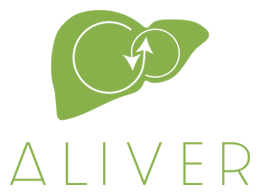
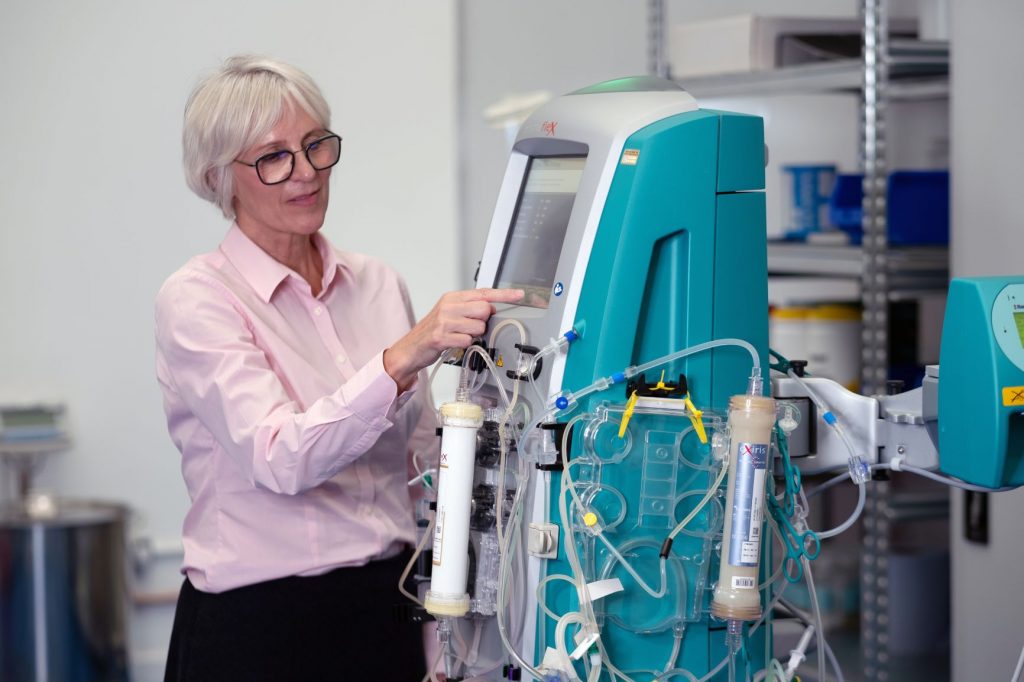
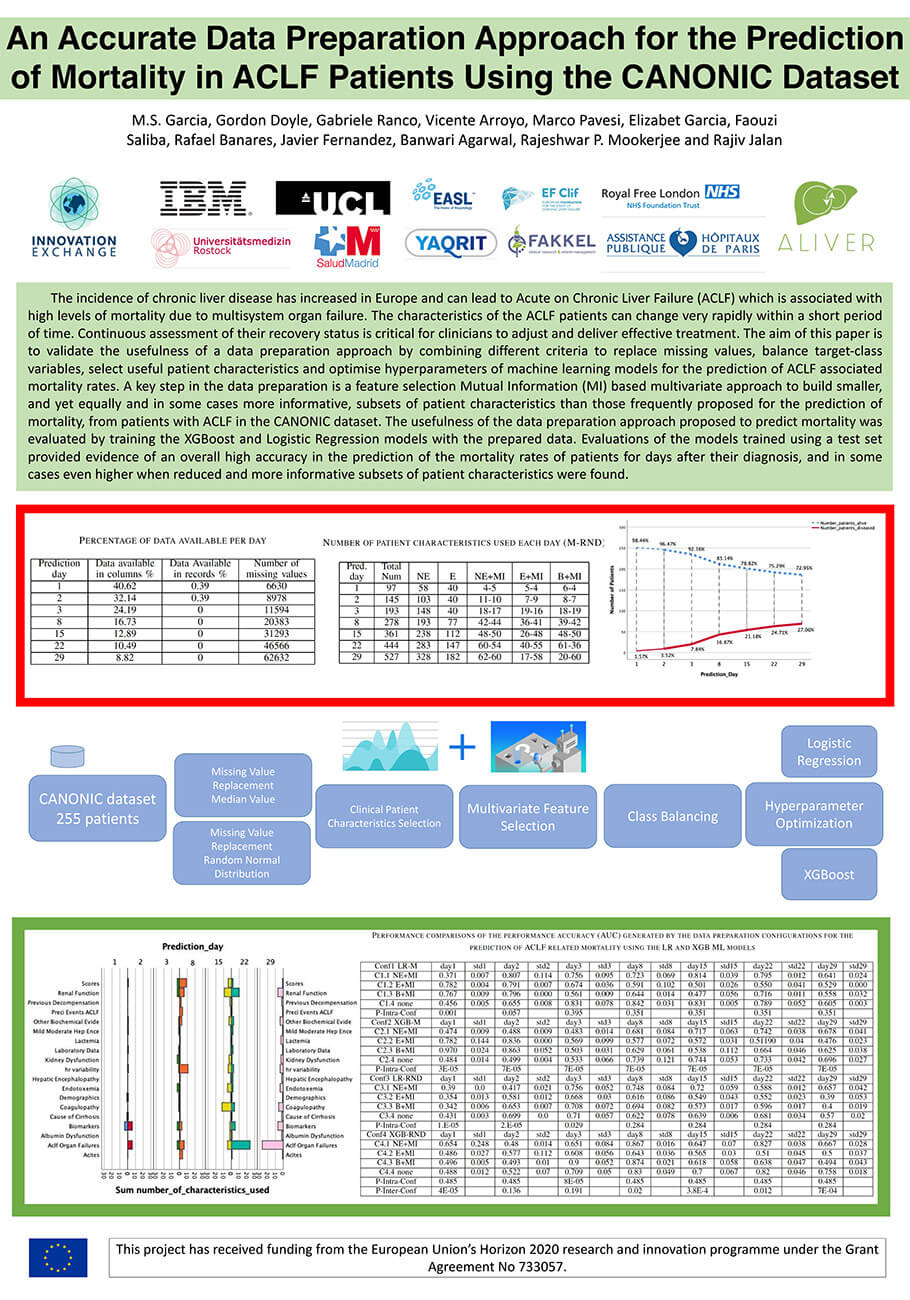
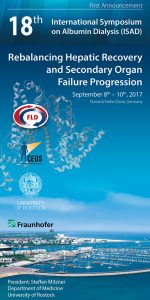





Recent Comments